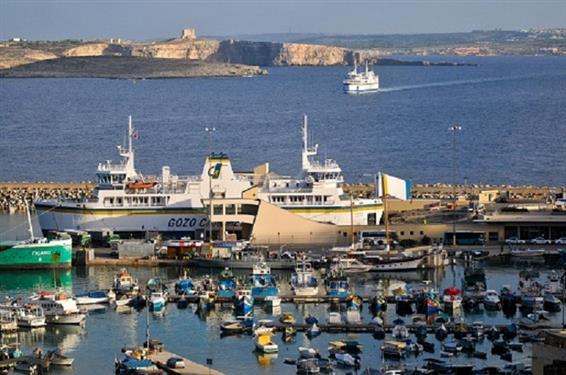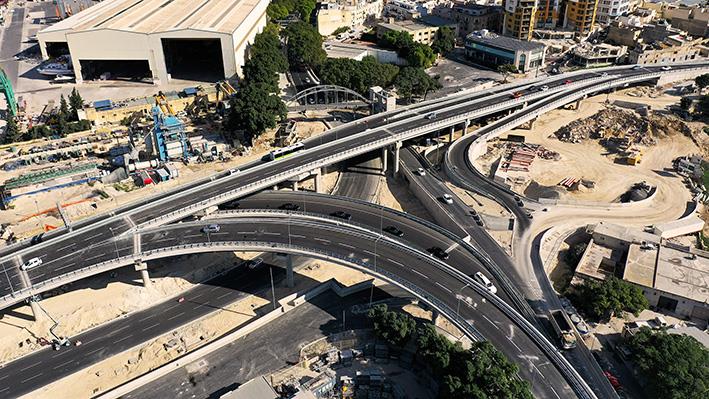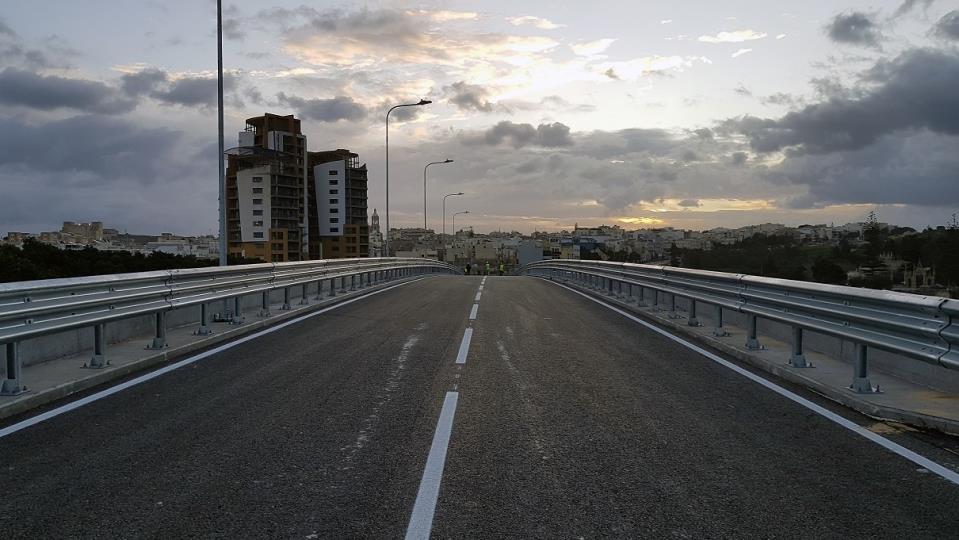The first line of a mass transportation system would take 8-10 years to complete, if the country decides to implement such a project, Transport and Infrastructure Minister Ian Borg told The Malta Independent on Sunday during an interview.
Minister Borg told this newsroom that international firm Arup had drawn up potential plans for an underground light rail system and that these documents have now been sent to other ministries for their consideration.
“The plans are ambitious, but at the same time there will be many challenges,” Borg said, without indicating when these plans will be released for consultation. "I'm not saying that this is a project the government will adopt or not. Everyone needs to understand that many discussions and studies need to be held and this is why a strong dose of realism is needed."
He wants a 'mature, apolitical discussion' on the plans once they are released.
Borg spoke of his wish for a bipartisan approach on this issue. This is not a project that, if implemented, would just take a single legislature to complete, but will take many years, he said.
The minister also defended the government’s decision to implement so many road projects before taking a decision on a mass transportation system. “Years ago our roads were already jammed. You would spend 30 minutes travelling from Mt Carmel to the Attard cemetery, today it takes two minutes. You would spend 20 minutes waiting at the Marsa traffic lights. These were projects that we urgently needed.”

Any upcoming projects you can reveal?
The first item of interest are our plans for the Grand Harbour - which are being discussed internally and will soon be announced. The second, is that we are at an interesting phase on the idea of a mass transportation system.
On the latter point, documents are no longer on my desk and have now been passed on, so that we can decide on the next step. These are obviously plans that will excite people, but at the same time we need to have a strong dose of realism. I will be keeping my word, putting forward the plans which were drawn up by foreign experts - Arup. The plans are ambitious, but at the same time there will be many challenges. Many questions will be raised and many discussions will be held.
So one awaits that, when the government publishes these plans for consultation, there would be a mature, apolitical discussion. We are speaking about plans for a project that would take tens of years to complete. This is a project which, if we someday decide to implement it, we would need to do so together.
On the Grand Harbour plans, are you referring to the Grand Harbour Clean Air project or to wider plans?
We already started working on the Grand Harbour Clean Air project, which is a Є50 million project dealing with cruise ships and Ro-Ro vessels. This project will make us one of the first ports in Europe that grants the facility for such vessels to switch off their engines when berthing and change over to using cleaner energy (through shore-side electricity).
I want to praise BirdLife for its contribution, as it had conducted an awareness-raising project on the pollution from emissions by vessels in the Grand Harbour. We acted fast, obtaining EU funds for the project
Regarding the regeneration, it will deal with everything and not just this project. So it will tackle better use of industrial zones related to the maritime sector, the regeneration of Marsa and the regeneration and conservation of Fort Ricasoli.
It will be an important document. We’ve had strategies in the past by other governments, and I hope we will have the chance to start implementing this one immediately.
When will this strategy document be released?
We are discussing it.
Who were the mass transportation documents passed on to?
It is an inter-ministerial issue. There are a number of ministries involved and so it was passed to them.
When speaking about a mass transportation system, are you speaking about a mix of rail and mono-rail...
A light rail, underground. The study looks at that option.
When will this be released for public consultation?
We are working on it.

You mentioned you would want agreement from all sides. By this, do you mean that you would want unanimous parliamentary approval?
For a far smaller project - the Malta-Gozo tunnel - we had taken the proposal to Parliament and reached a unanimous resolution. Without a doubt on a project like this, when we reach the point of taking a decision on procurement, if we reach that stage, then a bipartisan approach would be needed.
I am certain that even the Opposition would give its contribution. This is a project that we have long spoken about, but never had concrete plans in front of us on which we could decide.
Intense discussions on the economic and financial aspect of the project will be needed, as well a discussion on planning laws. One would even need to take into consideration the property aspect, taxation on the transfer of property etc. There are major challenges. There would be a variance in the value of property depending on whether it is located near a station or not. That is why I'm not saying that this is a project the government will adopt or not. Everyone needs to understand that many discussions and studies need to be held and this is why a strong dose of realism is needed.
What we have done is taken the first step. There is a plan which shows that from an infrastructural aspect, it is doable. Now, does it make sense financially? Do we want to move in this direction as a country? Will we accept that certain parts of the country will be tied to a network while others won't be as it doesn't make sense geographically and is not feasible?
So to clarify, the study just contains where the system would pass through? Do you have an estimation of the total cost of the project?
The study goes into a lot of detail, not just in terms of the network. It also includes the estimated cost. (He was unable to reveal it at this stage)

Infrastructure Malta has undertaken a lot of work over the years. One criticism that will be made is over why the government didn’t wait to start the mass transportation project before undertaking so many road projects, given that an underground system might need to go through some such areas?
The decision and investment related to mass transport is so enormous that interventions which cost much less and are aimed at the short-to-medium term were and are needed.
The PN used to say that they would solve the traffic problem by creating a mass transportation system. If we want to be realistic, after a number of hard and important decisions would need to be taken, from the day works would start it would take 8-10 years until we have the first line. That addresses mass transport on one line, not in the whole country.
Years ago our roads were already jammed. In Attard you would spend 30 minutes travelling from Mt Carmel to the Attard cemetery, today it takes two minutes for example. You used to spend 20 minutes waiting at the Marsa traffic lights.
These were projects which we needed urgently.
But, there is no single solution for all the transport challenges. There are many solutions that need to work together. We cannot waste the time we have now acquired. In the 90s there were ministers who implemented important projects. Over time the population increased, people became more dependent on private cars and the projects constructed in the 90s were filled with traffic.
We have undertaken many infrastructural projects, but from now until the near future, we need to ensure that we make cultural changes and undertake the projects needed so that in 30-years-time, today's projects will not be jammed with traffic.

There has been a lot of criticism that widening roads leads to more traffic...
There are a lot more people who are content. So for the 2,000 who complain, there are 200,000 who are content. People are today more content when you ask them about transport, logistics and mobility.
You've mentioned the possible mass-transportation system which is a longer-term goal. In the near to medium term, what are your plans to move people away from using their cars?
There are a number of initiatives. Firstly we are continuing our work on providing free public transport. Is it a solution to solve traffic? It is part of it, as is widening roads and utilising sea transport. Everything is part of the solution. You cannot just offer public transport for free and then not fix roads or work on using sea transport. It doesn't work like that.
Our electoral manifesto promises that we need to introduce free public transport for students, persons with disability and the elderly. We have already fully implemented this pledge for students and persons with disability, and the budget will bring it down for the elderly from 75+ to 70+. We need to reduce it a bit more as people younger than this are also considered elderly. That will be the last target before the next general election. Then we will have the new commitments in this regard.
But, offering free public transport to everyone does not mean that everyone will use public transport. In cities abroad that have offered free public transport, they note an increase in people who shift over, but it does not attract everyone. So there will still be many people who prefer using their own cars.
Another initiative is focusing good infrastructure, and by this I don't just mean for cars, but also for pedestrians and for cyclists.
There are a group of cyclists in an NGO who have their opinion, sometimes in favour and other times against the interventions made by Infrastructure Malta. But there are many other people who are not part of the NGO and cycle, who are content and appreciate that work is being done. There is still work to do, but every major project is seeing substantial investment in cycling lanes.
We also need to make better use of sea transport. Pre-Covid, the number of people crossing between Sliema and Valletta; and Valletta and Cottonera by sea was impressive. We wanted to create more stops in the North of Malta, the South and in Gozo in a single tender. However a Tribunal said that Gozo cannot be tied to these and so the tender had to fall through. I want to see more stops in Malta and also the fast ferry.
The fast ferry remains an important pledge and I am disappointed that we have not been able to introduce this yet. There are companies that are always arguing in terms of what form the tender should take. I will continue work so that, by the time the election arrives, we will have this service.
Infrastructure Malta had indicated that the proposed garden over St Anne's Street in Floriana is not a priority as they need to complete other projects by 2025. Do you think it should be brought up further on the priority list?
Infrastructure Malta was referring to the Strategic Plan agreed upon between the government and the EU Commission over projects that have to be implemented by 2025.
But Infrastructure Malta is not the government, and there are other aspects of the government that are responsible for greening projects etc.
I like the project a lot. Without a doubt there are a number of challenges. Either you wait and implement projects like the mass transportation system so that you can then eliminate the road and create the garden, but that would require waiting a lot of time. Or else, you need to create a good traffic management plan to close the entrance and exit veins from Valletta until the road tunnels are built. Those tunnels will need months or years to build. That road is one of the busiest in the country, and the cars would need to enter Valletta and Floriana from somewhere.
Environment Minister Aaron Farrugia is the minister who is looking at this project more than others. As a ministry we will help as much as possible to continue studying this proposal.